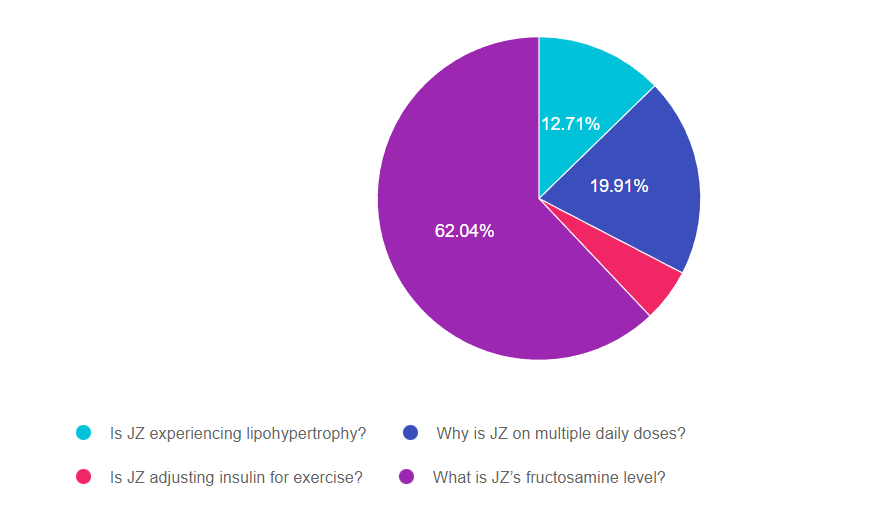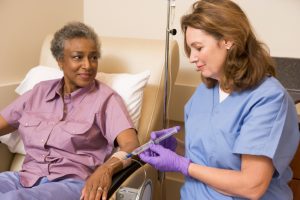
For last week’s practice question, we quizzed test takers on basal, bolus and blood transfusions. 62% of respondents chose the best answer. We want to clarify and share this important information, so you can pass it on to people living with diabetes and your colleagues, plus prepare for exam success!
Before we start though, if you don’t want any spoilers and haven’t tried the question yet, you can answer it below: Answer Question
Question:
JZ is excited about their A1c of 5.4%. They take bolus insulin 4 times a day, plus basal insulin at night. To treat their leukemia, JZ receives blood transfusions weekly.
What is your biggest concern?
Answer Choices:
- Is JZ experiencing lipohypertrophy?
- Why is JZ on multiple daily doses?
- Is JZ adjusting insulin for exercise?
- What is JZ’s fructosamine level?

Getting to the Best Answer
Answer 1 is incorrect. 12.71% chose this answer, “Is JZ experiencing lipohypertrophy?” This answer is tempting, but it is not accurate. Lipohypertrophy is a build up of fat at the injection site, often leading to hyperglycemia (not hypoglycemia) since much of the injected insulin is not being absorbed.
Answer 2 is incorrect. 19.91% of you chose this answer, “Why is JZ on multiple daily doses?” Another tempting answer, but is doesn’t address the reason behind the very low A1C. Certainly, we would want to investigate their regimen safety, but this doesn’t get to the intent of the question.
Answer 3 is incorrect. 5.33.% of respondents chose this answer, “Is JZ adjusting insulin for exercise?” Exercise can cause low blood sugar, but does it explain this A1C of 5.4%. JZ is getting blood transfusions to treat leukemia, can that be affecting their A1C?
Finally, Answer 4 is correct. 62.04% chose this answer, “What is JZ’s fructosamine level?” YES, GREAT JOB. For people receiving blood transfusions, A1C is not an accurate indicator of glucose levels, since they get infusions of non glycosylated red blood cells. This means they have new red blood cells mixing with their own glycosylated blood cells which can result in false lows A1C readings. For this situation, a better measurement is the fructosamine level, which measures the sugar coating of protein in the blood for the past 2-3 weeks. Fructosamine accuracy is not impacted by blood transfusions.
Thank you so much for reading this “Rationale of the Week”. You can download our Medication PocketCard below, for more information.
Want to learn more about this question? Join us for our
Level 4 | Cancer and Diabetes | 1.25 CEs
Recorded & Ready for Viewing!

Diabetes Education Services Online University Courses are an excellent way to study for your exam anytime and anywhere that is convenient for you. You will have immediate access to your courses for 1 year after your purchase date. Each individual online course includes a: video presentation, podcast, practice test and additional resources.
Patients with cancer often experience hyperglycemia secondary to treatment, which can increase risk of infection and compromise their nutritional status. In addition, recent research has identified the link between diabetes and cancer. Join us to learn more about this unexpected link and treatment strategies for steroid induced hyperglycemia using a case study approach.
Objectives:
- Discuss the relationship between cancer, hyperglycemia and insulin resistance.
- State 3 benefits of normalizing glucose levels during chemotherapy.
- Using a case study approach, discuss strategies to improve glucose levels and quality of life.
Intended Audience: These courses are knowledge-based activities designed for individual or groups of diabetes educators, including RNs, RDs, Pharmacists, Nurse Practitioners, Clinical Nurse Specialists, Physician Assistants and other health care providers interested in enhancing their knowledge of diabetes management for people with cancer.
Don’t worry if you can’t make it live. Your registration guarantees access to the recorded version in the Online University.
All hours earned count toward your CDCES Accreditation Information
Sign up for Diabetes Blog Bytes – we post one daily Blog Byte from Monday to Friday. And of course, Tuesday is our Question of the Week. It’s Informative and FREE! Sign up below!
The use of DES products does not guarantee the successful passage of the CDCES exam. CBDCE does not endorse any preparatory or review materials for the CDCES exam, except for those published by CBDCE.









